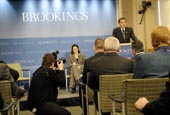Saakashvili on the recent popular uprisings and the Rose Revolution
By Mzia Kupunia
Monday, March 21

“An entrenched bureaucracy was killing any initiative in the society. There was crippling poverty, cynicism-inadequate infrastructure-an economy shackled by corruption. As you know as well, a peaceful, popular revolution brought to power a young team of reformists that I happened to lead. The situation in Georgia was so catastrophic that we had to build our state almost from scratch,” Saakashvili said “We opted in consequence for a radical course that would transform our old nation but young independent state into a regional laboratory for reforms,” the President added.
Saakashvili noted that the Georgian government “took the risk of launching a quick, radical and comprehensive reform process.” “Of course we did not succeed in everything – we had significant shortcomings and we made some mistakes,” he stated. “In Georgia we found no handbook to guide us. And there will be no operating manual for our Arab friends, either. But there were experiences, success and failures that we could study and that we did study,” the President said “Today, regional policy or opinion makers, including Russians, as surprising as it might sound – come to Georgia in search of ideas on new ways to address old problems,” he added.
The President pointed out that “there is still a lot to be done.” “We are more committed than ever in pursuing our path of reforms, to keep building a democracy at gunpoint,” he said, naming constructing sustainable civic institutions, building an effective civic education system, and nurturing competent citizens as a “challenge that takes more than 7 years.” “I do not pretend that this model is perfect – it is clearly not and we still have a long way to go before achieving our objectives,” Saakashvili said “Nor is our model necessarily transferable to other countries, but I would like to believe that this kind of transformation reveals some universal truths. The recent revolutions have shown us that the universal strife for freedom of people across the globe is the true motor of history,” he stated.
During a question and answer session at the Brookings Institution, Saakashvili spoke about the upcoming 2013 elections, saying that “We have good consultations with several political parties from opposition on new election code. Previous elections were deemed as a big step forward, but we want to have fair elections.” The president stressed that “this is pretty achievable with the climate we have.”
